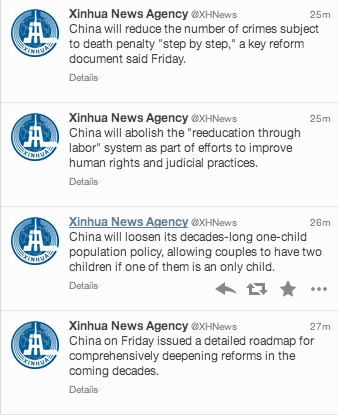China to reduce death penalty crimes, abolish labour camps and loosen one-child policy
State media Xinhua News Agency has reported a series of policy changes following the approval of "deepening reforms" in China by the CPC's Third Plenum.
This morning, Xinhua posted a series of tweets stating a loosening of the one-child policy, a reduction in the number of crimes subject to the death penalty and the abolition of the country's labour camp system. It has now given some more information on the policies:
The one-child policy will be relaxed, allowing couple to have two children if one of them is an only child. The birth policy will be adjusted and improved step by step to promote “long-term balanced development of the population in China”, said the CPC.
China’s family planning policy, introduced in the late 1970s to curb the population boom, limited most city-dwelling couples to one child and most rural couples to two, if the first-born was a girl. The policy has since been relaxed, and currently stipulates that both parents must be only children if they are to have a second child. It's increasingly unpopular in China, however, and is blamed for gender imbalances and the knock-on effects of social stigmas.
The country will abolish its current "re-education through labour" system, as part of a major effort to protect human rights. The labour camps were set up half a century ago and intern thousands of inmates. Individuals can be sentenced to the camps by a police panel, without trial.
Work will also be done to ban extorting confessions through torture and physical abuse, said the government's document. And when it comes to the number of crimes subject to the death penalty, there will be a "step-by-step" reduction. Laws relating to corrections, including community-based correction, are set to be improved.
The Third Plenum has also produced policy on state firms being required to pay larger dividends to the government, whilst private firms will be handed a greater role in the economy. Earlier in the week, the CPC said the market should be left to play a "decisive" role in the allocation of resources.
Interest rates and free convertibility of the yuan will both see liberalisation, with more overseas investment being allowed. The number of smaller and medium-sized banks funded by (qualified) private capital will be marginally increased, too.
Here are the initial tweets from Xinhua early today:
